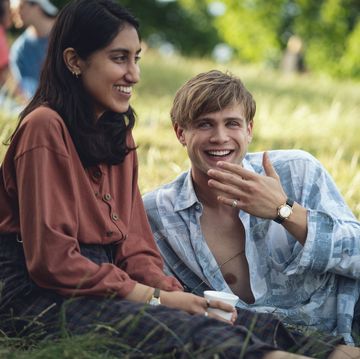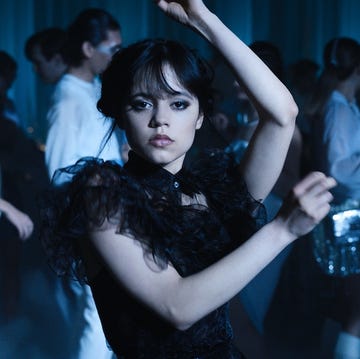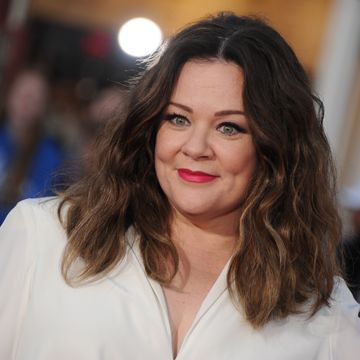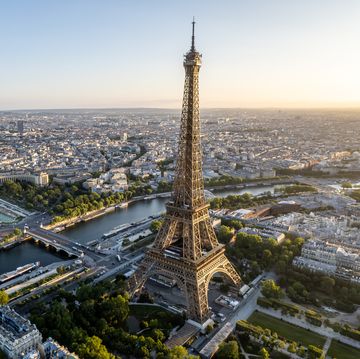Fiercely intelligent, spirited and playful – Emma Watson is the fresh new face of feminism. Editor-in-Chief Lorraine Candy joined her as she makes history at the United Nations in New York
All photos by Kerry Hallihan
The air is humid and sticky, a light shower threatens as Emma Watson and I look for somewhere to sit in New York's Central Park. The atmosphere in the city is tense.
Helicopters circle relentlessly overhead among the grey clouds this Sunday lunchtime. President Obama is due here today and there are significantly more police on the streets than usual because of the UN summit taking place.
As we wander, strangers stride up to Watson asking for an autograph or picture, and I witness a masterclass in patience and politeness as she repeatedly declines so we can conduct our interview.
When we find a bench, it's soaking wet. I'm concerned she'll ruin her beautiful cream 3.1 Phillip Lim dress by sitting down. She couldn't care less. 'Don't be daft,' I say, offering tissues to one of Hollywood's highest-paid and most-respected young actresses. And we wipe away the raindrops as yet more overexcited passers-by make a comic, often clumsy, beeline for us. I find this quite intrusive but Watson, 24, has been dealing with it since the age of nine, and her calm response is impressively professional.
In fact, Watson is an extremely impressive individual: fiercely intelligent with a razor-sharp mind. She has a new-found confidence so forceful she may well change the world. No, really, she might.
24 hours earlier: Saturday 20 September,UN Headquarters, New York
Her hands are trembling and, at first, her voice is decidedly wobbly. She is so nervous that I'm literally gripping the edge of my chair in the auditorium in solidarity as she steps on stage. 'Today we are launching a campaign called HeForShe,' Watson begins. 'I'm reaching out to you because we need your help. We want to end gender inequality – and, to do that, we need everyone involved.'
Slowly, Watson, newly appointed UN Women Goodwill Ambassador (the youngest ever), finds her mojo. The speech, which she wrote herself, begins to flow with authentic passion. 'I started questioning gender-based assumptions a long time ago. When I was eight, I was confused at being called "bossy" because I wanted to direct the plays we would put on for our parents – but the boys were not. When, at 14, I started to be sexualised by certain elements of the media. When, at 15, my girlfriends started dropping out of their beloved sports teams because they didn't want to appear "muscly". When, at 18, my male friends were unable to express their feelings. I decided that I was a feminist and this seemed uncomplicated to me,' she goes on.
UN Secretary-General Ban Ki Moon smiles up at Watson, and the powerful audience of 700 UN VIPs are riveted by this mesmerising woman in her Dior dress, dark lipstick and neat ponytail. The air is charged with electric expectancy. I don't like the overused phrase 'game changer', but it really is the only way to describe the scene I'm privileged to be witnessing. In just 20 minutes, I watch Watson become an agent of change.
As soon as she finishes her speech, there is a spontaneous standing ovation. An activist is born, and the fresh new face of feminism allows herself a small smile.
Later, at a cocktail party to celebrate the launch of the global HeForShe campaign, Watson, just 5ft 4in, is physically swamped by well-wishers.
She spots me in the crowd (we've met several times before: at the ELLE Style Awards and at her first UK magazine cover shoot for ELLE in 2009) and comes over to hug me. I'm surprised by this unexpected show of emotion from a normally reserved Watson. But tonight she's alive with energy, fired up by the response to her stateswoman-like speech (news of which, as ELLE went to press, had reached a total of 1.5 billion Twitter users). The hashtag #HeForShe trends worldwide, and is so powerful that Twitter paints it on the wall of their HQ.
The story dominates global headlines for a week and the speech is shared across millions of Facebook feeds. Friends of mine even send it to me, demanding I interview Watson on their behalf, and on behalf of their teenage daughters.
I don't tell them that I have already done so – that, in fact, we set up this interview and cover shoot the day after Watson's appointment as UN Women Goodwill Ambassador was announced in August for this Feminism Issue.
How wonderful, I think, that we now have a fresh new voice to talk feminism, a delightfully curious and wise woman to inspire a new generation.
Sunday 21 September, Central Park, New York
'I have been waiting do this for years,' Watson explains on that damp park bench. 'When I left university [she studied English Literature at Brown University, graduating in May this year], I felt there was something lacking. I knew I wanted to keep acting, but I wanted something else.
'Fame is not something I have always felt comfortable with, I have really grappled with it emotionally. And, in a funny way, doing this is my way of making sense of the fame, of using it. I have found a way to channel it towards something else, which makes it so much more manageable for me. And this is something I really believe in. I could talk about it for hours.'
And indeed she can. Feminism, feminists, feminist artists – for hours.
'Here's what I think,' she says assertively. 'Feminism is not here to dictate to you. It's not prescriptive, it's not dogmatic. All we are here to do is give you a choice. If you want to run for Prime Minister, you can. If you don't, that's wonderful, too. Shave your armpits, don't shave them, wear flats one day, heels the next. These things are so irrelevant and surface to what it is all really about, and I wish people wouldn't get caught up in that.
'We want to empower women to do exactly what they want, to be true to themselves, to have the opportunities to develop. Women should feel free. There is no typical feminist, there is nothing anywhere that says you have to meet a certain [set of] criteria.'
I had feared I'd have to put the cloak of authenticity over Emma when I wrote up this cover interview. Before meeting her, it wouldn't have been unreasonable to assume this actress, famous for her role as witch Hermione, was simply lending her name to a project in the way many celebrities do. This is not necessarily a bad thing, but when you stand up in front an audience of international world leaders, accomplished academics, fundraisers and global decision-makers and promise to tackle the thorny issue of gender inequality, you have to know your stuff or you'll be condemned forever as a fake. Ten minutes into the interview, I realise I've been incredibly patronising to think that about Watson.
'Initially, I thought I'd need to memorise all the statistics and information, but then I realised you can't sustain that,' she says. 'It's much more powerful to make people feel what the problems are, that's what stays with someone. And that's what fame can help with. I'm not pretending to be an economist or a politician. I'm not the most knowledgeable person on all the issues, but I am eager to learn.'
I tell her she looked nervous, and she bursts out laughing. 'I was very nervous. It wasn't an easy thing for me to do. It felt like: "Am I going to have lunch with these people, or am I going to be eaten? Am I the lunch?" But I just kept rereading the speech the day before and asking myself: "Do I believe this line?" and the answer was always "Yes". I hope people could see my vulnerability up there. I hope it made me more human, not less.'
Watson reveals her mum texted to congratulate her as soon as she sat down after her speech. She talks so eagerly about making sure she didn't wear too formal a suit, or appear too unapproachable for the speech that I wish our interview was videoed, so you could witness this warm and friendly woman in action.
She goes on: 'I've waited until I found the right thing to speak about. I didn't want to speak for the sake of it or just because I had the platform. I wanted to be 100% sure, and this UN role is just perfect for me. We need to stop preaching to the choir because feminism, women's rights and gender equality aren't about man-hating. When the UN explained the HeForShe campaign to me, I said: "This is it, let me run with it, because this is 100% my take on how we move forward."'
Watson does indeed seem particularly well-qualified to join the crusade to persuade men to engage with feminism. She has four brothers: Alex, who is three years younger, her dad's son Toby and her mum's two stepsons, Andrew and David. After her lawyer parents split up when she was five, she went on to spend more time with her father. She explains: 'My dad found himself alone with my younger brother and I for the first time. This was a whole new thing for him. So he did it in the only way he knew how, by involving us in everything he liked: fishing, cricket, tennis, books and just, you know, "adventuring". As a result, I wasn't aware there were "activities for boys" and "activities for girls". It wasn't: "This is for Emma, and this is for Alex." I learnt it all: to tie flies, to fish, to bowl. I have an excellent bowling arm.
'I'm lucky I was raised to believe that my opinion at the dinner table was valuable. My mum and I spoke as loudly as my brothers. She was a working single mother for a while. She set me an example that was more important than being there 100% of the time. She was a woman who valued herself. Seeing her having purpose and feeling good made me happy as a child.
'I understand that feminism is not a gender-neutral word. Historically, it has been associated with aggression, and also it has the word "feminine" in it, which is harder for men to accept. But there is no other word. By doing this, I am hoping it can be reimagined and redefined."
So far, so feminist. But, I wonder, is it still a huge weight of responsibility for such a young woman who has led such a private and unusual life? She was on film sets from the age of nine until 18 – the only one of the three young stars whose family didn't come along with them. She studied alone abroad and has been fiercely guarded about her private life. It will take a great deal of emotional and indeed physical strength to cope with putting her head so far above the parapet. Exploring this with Watson reveals a woman in a state of change.
brightcove.createExperiences();In 2010, she went to Bangladesh with ethical fashion charity People Tree. Later, she travelled to Zambia with Camfed (a non-profit organisation dedicated to eradicating African poverty through the education of girls) and, the week before the speech, she was in Uruguay with the UN to encourage young women to vote in their heavily male political hierarchy. She has immersed herself in the subject of women, politics, education and employment. Watson knows her stuff.
Meanwhile, she is still a critically acclaimed A-list actress, and her choice of new roles reflects her change in personal priorities. We will see her next in Regression, playing a traumatised young woman struggling with issues of abuse. And she is also producing her first film alongside Harry Potter producer David Heyman, based on young adult novel The Queen Of The Tearling, a book that has more in common with Game Of Thrones than, say, Twilight. Watson has cast herself as an angry princess, fighting to rule a kingdom in turmoil.
'My agent called and said: "I have to be honest, this is a trilogy!" I was reluctant, but when I read the book, I really wanted to spend three years in that world,' she explains. 'It's going to be intense and I am going to have to get physically very fit, build some muscle and learn how to wield a sword.'
When we wander back to Watson's hotel on the Upper East Side, I do so with a sense that I'm leaving a woman who has worked hard to silence the voices of her own inner turmoil. If I were to ask her if she'd had her heart broken, I know she would say yes; if she'd been lonely or depressed in her driven and often solitary career, she would also say yes. This isn't spoken but acknowledged when I ask her if she's ever had trouble sleeping. She has, but a love of yoga has put paid to that.
Watson spent the summer riding a moped around Rome ('Who knew that was on my bucket list?' she says) and moving into her new London flat. 'I'm a nester,' she adds. 'I spend a lot of time putting my safe place together. I've struggled with insomnia, but now I take care of myself, I've realised I'm not invincible. I travel, I cook, I look after my two cats, I do yoga and I read.'
We talk a little of our own personal heroes and role models, given she unintentionally became one in her role as Hermione.
She pauses and says thoughtfully: 'I think it's important to make the distinction between the person and the art that they create. I mean, I've worshipped some complete arseholes, who I've met and then wondered: "How did you write/do/say all those amazing things? !"'
I only mention this to make the points that: a) people often miss the playful humour that Watson possesses when they interview her, and b) in this case, the person is the role model. There is no separation. The likeable, accessible, learned and learning Emma Watson is the best woman I can see in a landscape of new voices rising to wield the sword of today's new, inclusive feminism. And I wish her luck.












